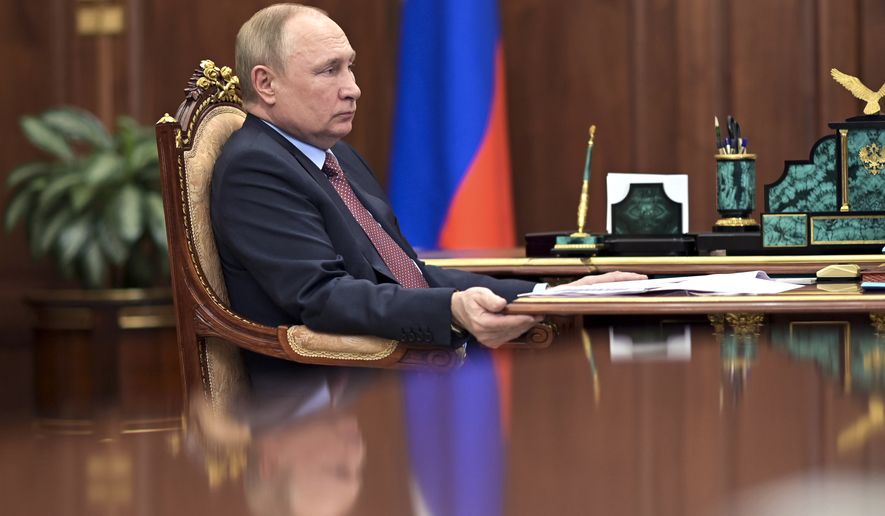OPINION:
Vladimir Putin’s unabashed aggression toward neighboring Ukraine has been universally panned by the international community, with the possible exception of Belarus and China. China seems pretty important in this whole world affairs thing. They don’t seem particularly upset that Russia has invaded a sovereign nation.
The death count in the Russia - Ukraine war may be over 11,000 and is indisputably growing. The US military estimates that between 2,000 and 4,000 Ukrainian armed forces have been killed and that Russian losses may be as high as 6,000. As of April 5th, 1,563 civilian deaths in Ukraine were reported by the Office of the United Nations High Commissioner for Human Rights.
War is always horrific and this one is no exception. Some Americans have grown numb to the images that pop up on the various television news networks, but for those that take the time to look, it is nothing short of disturbing. The Russians appear to be taking a painstaking effort to make their attack as painful, both physically and psychologically, as possible.
Speaking to the United Nations Security Council, Ukraine President Volodymyr Zelensky made some extraordinarily alarming claims about Russian forces. “They shot and killed women outside their houses. They killed entire families, adults and children, and they tried to burn the bodies.” He spoke about the horror he personally witnessed after a visit to the town of Bucha, located just outside the capital, Kyiv. “They cut off limbs, slashed throats, raped women in front of their children.”
While no one can control the actions of Putin as long as he remains in charge in Russia, the United Nations and other international organizations can certainly play a role. They can penalize Russia and perhaps most importantly, demonstrate a better approach to international disagreement.
The world might take a page from the countries of Morocco and Spain for example. There exists a generation-old disagreement known as the Western Sahara Dispute. It is a conflict between the Kingdom of Morocco and the people of little-known Western Sahara. For those unfamiliar, an oversimplified explanation follows.
Western Sahara is a region on North Africa’s Atlantic coast bordering Morocco, Algeria and Mauritania. It is approximately the size of Colorado. Spain colonized the area in 1884. It was part of the Spanish kingdom for the better part of 100 years. In 1975 hundreds of thousands of Moroccans peacefully entered the area, effectively claiming it as their own. Spain subsequently transferred control of the region to Morocco and Mauritania.
That said, there is a native population known as the Sahrawis in the region. Credible estimates put their population over 500,000. They are demanding an independent nation-state of Western Sahara. During the 1970s and 1980s, they led guerrilla attacks against Morocco and Mauritania in an effort to push their cause. Mauritania renounced its claim to the region and Moroccan authorities gradually built a wall through the territory. In 1991 the United Nations-brokered an agreement to bring an end to the violence, but the disagreement remains.
Morocco has offered a compromise that would grant the Sahrawi people autonomy and authority within an area of the Moroccan state.
While the United Nations does not recognize an independent state, in recent years, representatives of the UN have made public comments that have caused some in Morocco to question the UN’s neutrality in the long-simmering dispute.
Despite the frustration with the UN, on March 1st Moroccan Justice Minister Abdellatif Ouahbi, speaking at the 49th regular session of the United Nations Human Rights Council, said Morocco continues to support the efforts of the UN Secretary-General and that Ouahbi’s country is committed to a genuine and pragmatic political solution. It was an admirable display of good, old-fashioned diplomacy.
This was followed up a couple of weeks later the President of the Government of Spain, Pedro Sánchez issued a message directly to King Mohammed VI of Morocco. It read in part, that Spain “recognizes the importance of the Sahara issue for Morocco”. As such, “Spain considers the autonomy initiative presented by Morocco in 2007, as the basis, the most serious, realistic and credible, for resolving the dispute.”
The President of the Spanish Government also stressed that “the two countries are inextricably linked by affections, history, geography, interests and shared friendship”. Mr. Sanchez said he was “convinced that the destinies of both peoples are liked as well” and that “the prosperity of Morocco is linked to that of Spain, and vice versa”.
Read that again. The only two nations that have officially controlled Western Sahara during the last 140 years aren’t fighting over it. In fact, they are engaged in a diplomatic love-fest, realizing the stability and territorial integrity of their respective nation-states are more important than an arid region where less than one-fifth of the land is actually used for agriculture. Morocco has offered a reasonable compromise that would grant the Sahrawi people autonomy yet preserve Moroccan sovereignty.
Reasonable. Rational. Diplomatic.
Morocco’s actions in their effort to settle the dispute should be the standard by which the United Nations holds all nations in issues of dispute. Conversely, invading a country, killing thousands of civilians and tens of thousands of military troops is the action for which perpetrators, in this case, Russia, must be firmly and swiftly held accountable.
• Tim Constantine is a columnist for The Washington Times and hosts “The Capitol Hill Show” podcast every week from Washington, D.C.




Please read our comment policy before commenting.